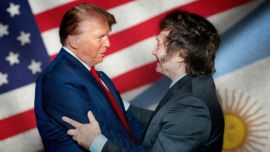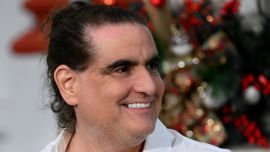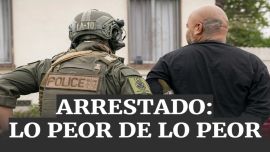Patricia Bullrich began to bid farewell to the Security Ministry this week, hosting a ceremony to thank the US Embassy and its agencies operating in the country for their cooperation with the government of Mauricio Macri.
“Argentina took great advantage of the cooperation it has had from the United States. It has been the country in Latin America which has fought most against terrorism and drugs,” Bullrich said in a ceremony held at the ministry’s headquarters in the City neighbourhood of Recoleta.
The minister – who was recently chosen to head President Macri’s PRO party – positioned Argentina as the Latin American country best attuned to Washington. “Before it was Colombia, now it is Argentina,” said Bullrich.
The ceremony took place Tuesday in a room full of US officials and the heads of Argentina’s federal security forces. Bullrich’s deputies Gerardo Milman and Eugenio Burzaco also joined in, handing out plaques to honour representatives of US agencies.
“We’re going to miss you,” US Ambassador Edward Prado told Bullrich, who is seen as a key supporter of the White House within Macri’s Cabinet. “The work has to continue because the criminals do,” he added. “We have to be a team: Argentina, the United States, and the provinces.”
The first agreements with Washington governing serious crimes were signed in March 2016, when then-US president Barack Obama visited the country on the eve of the 40th anniversary of the last military coup. They included, among other areas, cooperation on terrorism, human-trafficking, as well as sharing DNA data.
The visa process was then facilitated and the Casa Rosada – through the Security and Defence Ministries – worked with US authorities to ensure the protection of the presidents who participated in last year’s G20 summit in Buenos Aires.
According to Bullrich, members of the Federal Police and the Gendarmerie (Border Guard) also took courses in crisis management and hostage-taking with US experts.
More than 500 Argentine officials also participated in activities with the FBI. Bullrich revealed the Bureau had advised Argentina on what technology to buy over the past four years.
“We appreciate all the help they have given us in intelligence,” she said.
Bullrich also admitted that the DEA intervened in the so-called “white coils” case, discovered in 2017 and which unveiled a local connection to a Mexican cartel to export cocaine to Canada and Europe. The minister also thanked the US Department of Homeland Security for its cooperation, but she did not explain what actions were taken jointly. The DHS was created after the September 11, 2001 terrorist attacks to prevent other similar threats and natural disasters.
The ceremony held to thank the US authorities surprised some government officials and others who served in the Security Ministry.
“When I was at the Ministry, we had no relationship with the Embassy or the DEA,” prosecutor Cristina Caamaño, who served as security secretary for the government of Cristina Fernández de Kirchner when the ministry was in the hands of Nilda Garré, told the Times.
Caamaño joined the ministry after successfully investigating the murder of Partido Obrero militant Mariano Ferreyra in 2010. After a brief stint in the Cabinet, Caamaño returned to her post as prosecutor. Between 2015 and 2016, she managed the wiretapping office and currently presides over the NGO Justicia Legítima (“Legitimate Justice”).
"We never went to the Embassy, nor organised any ceremony of this kind. Garré was always very careful," Caamaño added.
Witness protection
The government yesterday issued a decree creating a national witness protection agency. The programme has so far operated under the Justice Ministry but the Macri administration argued that a way should be found to ensure the safety of witnesses who reported alleged corruption against Kirchnerite officials before the new government takes office.
"We did not have special cooperation from the United States," Justice Minister Germán Garavano told the Times. "But we have taken into account the Canadian model to create the witness protection agency," he added.
According to the minister, Canada has one of the best witness protection programmes, so there were exchanges, training, and conversations with this country.
"We believe the decree is a good synthesis of what the programme left behind in 15 years of operation and of what we've discussed with prosecutors and judges,” Garavano added.
Macri had sought to move the area to the Supreme Court – as it had done with the wiretapping office – but the justices declined the offer. Their colleagues at the Federal Cassation Court, the country's highest criminal appeals court, also did not agree to take responsibility for the programme which protects those who testified in cases of human rights abuses during the last dictatorship, drug and human-trafficking and graft probes involving former officials.
According to the new decree, the agency will become autonomous. An executive director will be in charge and will have to be selected by an advisory council. This council will be made up of the head of the Cassation Court, the attorney general or a representative and the security secretary.
An advisory council is expected to meet next week. Until now the president of the Cassation Court is Carlos Mahiques but his colleagues will have to elect a replacement in the next few days. Eduardo Casal is the current acting attorney general, but Alberto Fernández will make a nomination as soon as he takes office. Burzaco will participate in the meeting on behalf of Macri's government, according to official sources.
However, the Cassation Court is likely to resist the new decree. A meeting was held on Friday at the Comodoro Py courthouse, where most of the members of the country’s top criminal tribunal expressed their opposition to the creation of the new agency. The only exception was Judge Juan Carlos Gemignani. A new meeting will be held on Monday. Mahiques was absent because he is on holiday.
At press time, Fernández had not made public his opinion on the new decree, but days ago he had said he was against the transfer of this area to the Judiciary.


















Comments